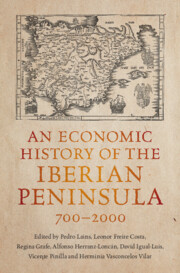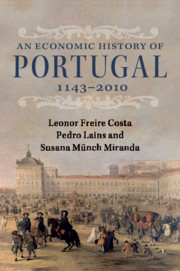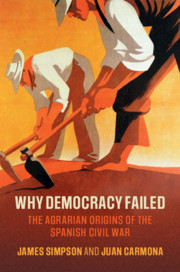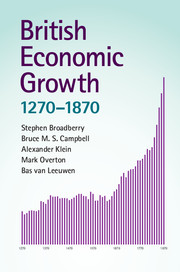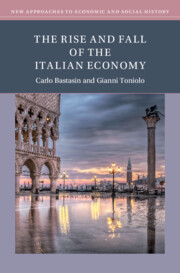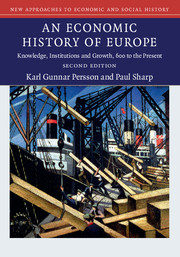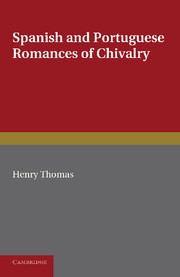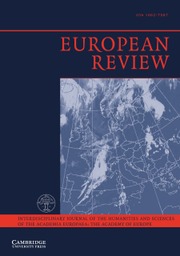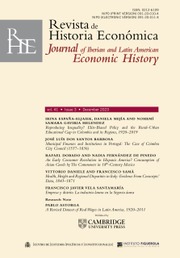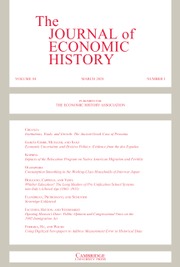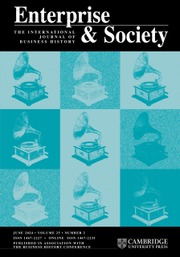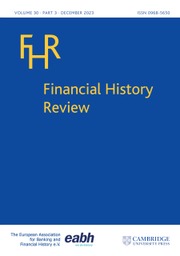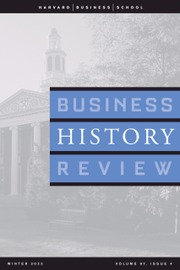An Economic History of the Iberian Peninsula, 700–2000
- Editors:
- Leonor Freire Costa, Universidade de Lisboa
- Regina Grafe, European University Institute, Florence
- Alfonso Herranz-Loncán, Universitat de Barcelona
- David Igual-Luis, Universidad de Castilla-La Mancha
- Vicente Pinilla, Universidad de Zaragoza
- Hermínia Vasconcelos Vilar, Universidade de Évora, Portugal
- Date Published: February 2024
- availability: Available
- format: Hardback
- isbn: 9781108488327
Hardback
Other available formats:
eBook
Looking for an inspection copy?
Please email [email protected] to enquire about an inspection copy of this book
-
This is a comprehensive long-run history of economic and political change in the Iberian Peninsula. Beginning with the development of the old medieval kingdoms, it goes on to explore two countries, Portugal and Spain, which during the early modern period possessed vast empires and played an essential role in the global economic and political developments. It traces how and why both countries began to fall behind during the first stages of industrialization and modern economic growth only to achieve remarkable economic development during the second half of the twentieth century. Written by a team of leading historians, the book sheds new light on all aspects of economic history from population, agriculture, manufacturing and international trade to government, finance and welfare. The book includes extensive new data and will be an essential work of reference for scholars of Portugal and Spain and also of comparative European economic development.
Read more- Provides an empirically rich state of the art overview of the economic history of Spain and Portugal and introduces the reader to the most important debates in the field
- Based on extensive new data on Spanish and Portuguese development from the Middle Ages to the present
- Reflects the very latest scholarship and debates in the field with contributions from an international team of over sixty historians
Reviews & endorsements
'Pedro Lains's concern for the economic history of Iberia goes back almost forty years, to the first conference comparing Italy, Portugal, and Spain held in Seville in 1984. He dedicated his academic life to expand and deepen the comparison. This volume, a landmark in comparative history to which leading scholars in the field contributed, is the culmination of that intellectual project.' Leandro Prados de la Escosura, Universidad Carlos III
See more reviews'This ambitious project to provide an up to date economic history of the lands of the Iberian peninsula and of their overseas settlements and colonies from the Middle Ages to the present is a remarkable achievement. Leading specialists analyze and revise our understanding of Spain and Portugal in relation to the rest of Europe and as a springboard for a global economy—an indispensable starting point for the next generation of historians.' Stuart Schwartz, Yale University
'This massive volume of Iberian economic history draws together for the first time a vast array of the latest research by the most significant scholars. A rich tapestry of national perspectives, from the early middle ages to current times, is enriched by thematic cross-country analyses and tempered by broader European perspectives.' Jaime Reis, Universidade de Lisboa
Customer reviews
Not yet reviewed
Be the first to review
Review was not posted due to profanity
×Product details
- Date Published: February 2024
- format: Hardback
- isbn: 9781108488327
- length: 808 pages
- dimensions: 229 x 152 x 43 mm
- weight: 1.397kg
- availability: Available
Table of Contents
Preface: By way of presentation Pedro Lains
Introduction Leonor Freire Costa, Regina Grafe, Alfonso Herranz-Loncán, David Igual Luis, Vicente Pinilla and Herminia Vasconcelos Vilar
Part I. The Making of Iberia, 700–1500 David Igual Luis and Hermínia Vasconcelos Vilar
Section I. The Early Middle Ages, 700–1200:
1. Muslim and Christian polities, 700–1200 Hermenegildo Fernandes and Flocel Sabaté
Section II. The Medieval Economy, 1000–1500:
2. Production, 1000–1500 María Asenjo-González and Antoni Furió
3. Population, 1000–1500 Luís Miguel Duarte, Ignacio Álvarez Borge and Mario Lafuente Gómez
4. The polity, 1000–1500 Maria Helena Coelho, Francisco Franco-Sánchez, Jesús Ángel Solórzano Telechea and Hermínia Vasconcelos Vilar
5. Money, credit and banking, 1000–1500 David Carvajal, António Henriques and Pere Verdés
6. Technology, 1000–1500 Arnaldo Sousa Melo, Germán Navarro Espinach and Ricardo Córdoba de la Llave
7. Living standards, 1000–1500 Hipolito Rafael Oliva Herrer, Pere Benito i Monclús and Isabel dos Guimarães Sá
8. International trade and commerce, 1000–1500 Hilario Casado Alonso, David Igual Luis, Flaìvio Miranda and Joana Sequeira
9. The Iberian economy in global perspective, 700–1500 Jeff Fynn-Paul
Part II. Globalization and Enlightenment (1500–1800):
10. Patterns of Iberian economic growth in the early modern period Nuno Palma and Carlos Santiago-Caballero
11. Population of Iberian peninsula in the early modern period: a comparative and regional perspective Andreia Durães and Vicente Pérez Moreda
12. Institutions and policy (1500–1800) Mafalda Soares da Cunha, Francisco Gil Montes and Ana Sofia Ribeiro
13. Early modern financial development in the Iberian Peninsula Leonor Freire Costa, Susana Münch Miranda and Pilar Nogues Marco
14. Science, knowledge and technology, 1500-1800 Carlos Alvarez-Nogal, Alejandro García-Montón, and Pedro Lains
15. Living standards, inequality, and consumption (1500–1800) Esteban Nicolini, Fernanda Olival and Fernando Ramos-Palencia
16. Trade and the colonial economies, 1500–1828 Cátia Antunes, Regina Grafe and Xabier Lamikiz
17. The economic history of Iberia in a wider context, 1500–1800 Bartolomé Yun-Casalilla
Part III. Industrialization and Catching-Up, 1800–2000 Alfonso Herranz-Loncán and Vicente Pinilla:
18. Economic growth and the spatial distribution of income, 1800–2000 Alfonso Herranz-Loncán, M. Teresa Sanchis-Llopis and Daniel A. Tirado-Fabregat
19. Population growth, composition, and educational levels Amélia Branco and Fernando Collantes
20. Economic policies and institutions José Luís Cardoso and Francisco Comín
21. Iberian financial system, 1800–2000 Pablo Martín-Aceña and Rita Martins de Sousa
22. Economic growth and structural change in the Iberian economies, 1800–2000 Luciano Amaral, Concha Betrán and Vicente Pinilla
23. Living standards in Iberia, 1800–2010 Alfonso Díez-Minguela, Jordi Guilera and Julio Martinez-Galarraga
24. Iberian globalization and catching up in the poor South European periphery. 1830–2010 Antonio Tena-Junguito, Giovanni Federico and Ester G. Silva
25. The Iberian economy in comparative perspective, 1800–2000 Stephen Broadberry and Rui Pedro Esteves.
Sorry, this resource is locked
Please register or sign in to request access. If you are having problems accessing these resources please email [email protected]
Register Sign in» Proceed
You are now leaving the Cambridge University Press website. Your eBook purchase and download will be completed by our partner www.ebooks.com. Please see the permission section of the www.ebooks.com catalogue page for details of the print & copy limits on our eBooks.
Continue ×Are you sure you want to delete your account?
This cannot be undone.
Thank you for your feedback which will help us improve our service.
If you requested a response, we will make sure to get back to you shortly.
×
